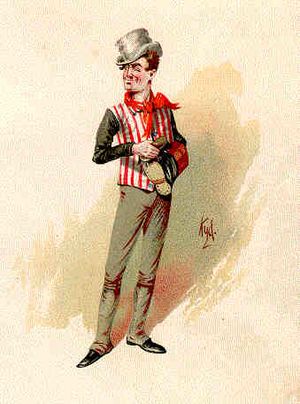Wellerism facts for kids
Wellerisms are funny sayings that twist common proverbs or phrases. They often show that a well-known saying might not be true in every situation, especially when you take it literally. Think of them as a type of "anti-proverb" because they go against the usual meaning of a proverb.
These sayings are named after Sam Weller, a character in Charles Dickens's famous novel The Pickwick Papers. Sam Weller was known for using these kinds of clever and humorous phrases.
A typical Wellerism has three parts:
- First, a proverb or a common saying.
- Second, who said it (the speaker).
- Third, a funny or unexpected explanation that often takes the saying literally.
Sam Weller's unique way of speaking even inspired plays! Sometimes, the writers of these plays would create even more Wellerisms.
A special kind of Wellerism is called a Tom Swifty. In these, the speaker's name or action is a funny pun related to what they said.
Contents
What Are Wellerisms?
Wellerisms add humor to everyday phrases. They make you think about words in a new, often silly, way. By adding a speaker and a twist, they turn a serious proverb into a joke.
Funny Examples from The Pickwick Papers
Here are some examples of Wellerisms from Charles Dickens's book The Pickwick Papers:
- "Then the next question is, what the devil do you want with me, as the man said, wen he see the ghost?"
- This means: "What do you want?" said the man when he saw a ghost. It's a funny way to ask someone's purpose.
- "Out vith it, as the father said to his child, when he swallowed a farden."
- This means: "Spit it out!" said the father to his child who swallowed a coin. It's a humorous way to tell someone to say what's on their mind.
- "Wery glad to see you, indeed, and hope our acquaintance may be a long 'un, as the gen'l'm'n said to the fi' pun' note."
- This means: "I'm glad to see you, and hope we know each other for a long time," said the gentleman to a five-pound note. It's a joke about wanting money to last.
- "There; now we look compact and comfortable, as the father said ven he cut his little boy's head off, to cure him o' squintin'."
- This means: "Now we look neat and comfortable," said the father after a very extreme (and silly) solution. This one is dark humor, showing how literally taking something can go wrong.
- "Vich I call addin' insult to injury, as the parrot said ven they not only took him from his native land, but made him talk the English langwidge arterwards."
- This means: "This is adding insult to injury," said the parrot. It's a funny way to say things got worse after already being bad.
Wellerisms Around the World
Wellerisms are not just found in English! Researchers have found them in many languages across the world.
For example, they are common in the Yoruba language of Nigeria. They are also found in many Ethiopian languages, like Guji Oromo and Alaaba. Even ancient Sumerian texts contain Wellerisms.
These types of sayings have been found in Africa, Europe, and parts of Asia.
Animals as Speakers
In many languages, especially in Africa, animals are often the speakers in Wellerisms. Sometimes, the animal is chosen just for fun. But other times, the animal is picked because its special qualities fit the saying perfectly.
For example, in the Chumburung language of Ghana, there's a Wellerism: "Chameleon says quickly quickly is good and slowly slowly is good." The chameleon is known for changing speed, making it a good choice for this saying.
Another example from the Tiv language in Nigeria is: "The bat says that there is no difference between standing down and upright." This fits the bat, which hangs upside down.
Wellerisms and Dialogue Proverbs
Wellerisms are similar to, but not exactly the same as, dialogue proverbs.
What's the Difference?
- A Wellerism usually has just one speaker.
- Dialogue proverbs, however, include direct speech from more than one person or character.
You can find dialogue proverbs in languages like Armenian, French, Georgian, and Pashto.
Here are some examples of dialogue proverbs:
- "They asked the camel, 'Why is your neck crooked?' The camel laughed roaringly, 'What of me is straight?'" (From Shor/Khakas in SW Siberia)
- "Let me go, Spider!" "How can I let go of my meat?" "Then get on with it, eat me!" "How can I eat a fly?" (From Kasena)
- "I have caught a bear." "Get rid of him." "I can't, he won't let me go." (From Armenian)
See also
 In Spanish: Wellerismo para niños
In Spanish: Wellerismo para niños
- Paraprosdokian
 | Aaron Henry |
 | T. R. M. Howard |
 | Jesse Jackson |


